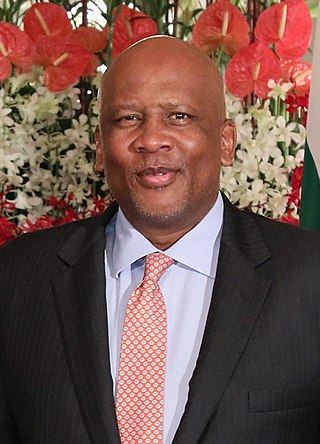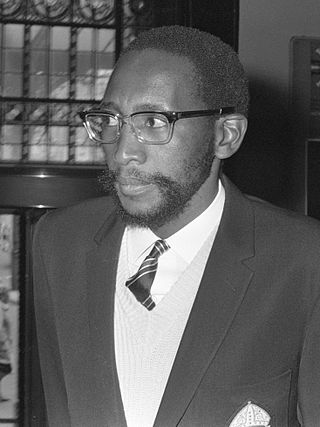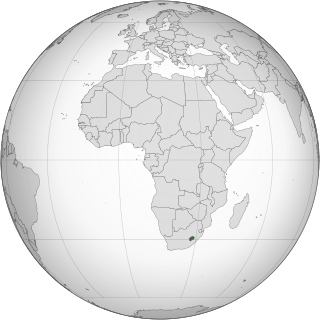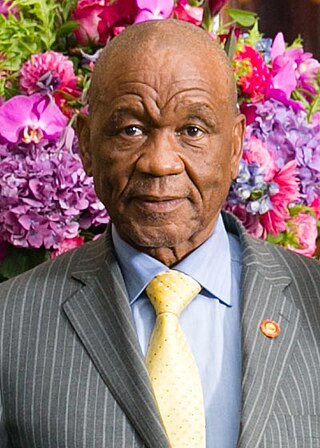
Lesotho, formally the Kingdom of Lesotho, is a landlocked country in Southern Africa. As an enclave of South Africa, with which it shares a 1,106 km border, it is the only sovereign enclave in the world outside of the Italian Peninsula. It is situated in the Maloti Mountains and contains the highest peak in Southern Africa. It has an area of over 30,000 km2 (11,600 sq mi) and has a population of about 2 million. Its capital and largest city is Maseru.

Letsie III is King of Lesotho. He succeeded his father, Bereng Seeiso Moshoeshoe II, who was forced into exile in 1990. His father was briefly restored in 1995 but died in a car crash in early 1996, and Letsie became king again. As a constitutional monarch, most of King Letsie's duties as monarch of Lesotho are ceremonial. In 2000, he declared HIV/AIDS in Lesotho to be a natural disaster, prompting immediate national and international response to the epidemic.

Moshoeshoe II, previously known as Constantine Bereng Seeiso, was the Paramount Chief of Basutoland, succeeding paramount chief Seeiso from 1960 until the country gained full independence from Britain in 1966. He was King of Lesotho from 1966 until his exile in 1990, and from 1995 until his death in 1996.

The National University of Lesotho, the main and oldest university in Lesotho, is located in Roma, 34 km (21 mi) southeast of Maseru, the capital of Lesotho. The Roma valley is broad and is surrounded by a barrier of rugged mountains which provides magnificent scenery. The university enjoys a temperate climate with four distinct seasons. The governing body of the university is the council and academic policy is in the hands of Senate, both Council and Senate being established by the Act.
'Mamohato Bereng Seeiso served as the Regent Head of State of Lesotho on three occasions: 5 June to 5 December 1970, 10 March to 12 November 1990 and 15 January to 7 February 1996.

Prince Seeiso Bereng Seeiso of Lesotho, Principal Chief of Matsieng is the younger brother of Lesotho's King Letsie III, and son of the Southern African country's late King Moshoeshoe II (1938–1996) and the late Queen 'Mamohato Bereng Seeiso (1941–2003).

Prince Lerotholi Seeiso is a member of the royal family of Lesotho and the current heir apparent to the throne.

'Masenate Mohato Seeiso is Queen of Lesotho as the wife of King Letsie III of Lesotho. She was the first commoner in modern history to marry into the royal family of Lesotho. Since becoming queen, she has become the patron of several charities and has worked to promote the work of projects related to HIV/AIDS.
A senate is a deliberative assembly, often the upper house or chamber of a bicameral legislature.
'Mantšebo was the ruler of Basutoland from 1941 to 1960, as the regent for her stepson, the future Moshoeshoe II.
Education in Lesotho has undergone reforms in recent years, meaning that primary education is now free, universal, and compulsory.

Lesbian, gay, bisexual, and transgender (LGBT) people in Lesotho face legal challenges not experienced by non-LGBT residents. Lesotho does not recognise same-sex marriages or civil unions, nor does it ban discrimination on the basis of sexual orientation or gender identity.

Princess Mabereng Seeiso of Lesotho is a member of the Royal Family of Lesotho. Princess Seeiso is the wife of Prince Seeiso of Lesotho and the sister-in-law of King Letsie III of Lesotho.

General elections were held in Lesotho on 26 May 2012. The incumbent Prime Minister Pakalitha Mosisili's newly formed Democratic Congress won a majority of single-member seats. He also won his seat by the second-largest margin of victory. However, they only had a plurality in the overall tally and coalition talks are taking place.

Human rights in Lesotho, a nation of 2,067,000 people completely surrounded by South Africa, is a contentious issue. In its 2012 Freedom in the World report, Freedom House declared the country "Partly Free". According to the United States Bureau of Democracy, Human Rights and Labor, which produces annual human rights reports on the country, the most pressing human rights issues are the use of torture, poor prison conditions, and the abuse of women and children.

On 30 August 2014, Lesotho's Prime Minister Tom Thabane alleged that a coup d'état had been launched against him. This followed a previous allegation which caused him to suspend parliament over possible extra-constitutional manoeuvres. It also followed pressure from South Africa to maintain the democratic process. The next day, Deputy Prime Minister Mothetjoa Metsing assumed responsibility for running the government. An early election was held in February 2015 as a result of South African-led Southern African Development Community (SADC) mediation, giving power to the opposition.

General elections were held in Lesotho on 28 February 2015 for all 120 seats of the National Assembly, the lower house of the Parliament of Lesotho, more than two years ahead of schedule due to the 2014 political crisis. Following mediation facilitated by the Southern African Development Community (SADC), King Letsie III on the advice of the incumbent Prime Minister Tom Thabane, dissolved the Eighth Parliament and called a snap election.

Princess 'Maseeiso Mohato Seeiso is a princess of Lesotho, the second child of King Letsie III of Lesotho and his wife Queen 'Masenate Mohato Seeiso.

Basotho nationality law is regulated by the Constitution of Lesotho, as amended; the Lesotho Citizenship Order, and its revisions; the 1983 Refugees Act; and various international agreements to which the country is a signatory. These laws determine who is, or is eligible to be, a national of Lesotho. The legal means to acquire nationality, formal legal membership in a nation, differ from the domestic relationship of rights and obligations between a national and the nation, known as citizenship. Nationality describes the relationship of an individual to the state under international law, whereas citizenship is the domestic relationship of an individual within the nation. In Britain and thus the Commonwealth of Nations, though the terms are often used synonymously outside of law, they are governed by different statutes and regulated by different authorities. Basotho nationality is typically obtained under the principle of jus soli, born in Lesotho, or jus sanguinis, i.e. by birth in Lesotho or abroad to parents with Basotho nationality. It can be granted to persons with an affiliation to the country, or to a permanent resident who has lived in the country for a given period of time through naturalisation.

Ntsokoane Samuel Matekane is a Mosotho businessman and politician who is the current Prime Minister of Lesotho. Prior to running, he was considered to be the richest person in the country. Matekane made his fortune in diamond mining, as well as through government issued construction contracts. He founded his company, Matekane Group of Companies (MGC) in 1986.










